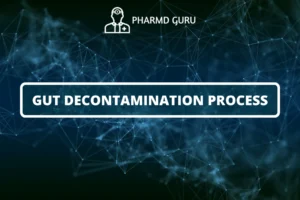Barbiturates and benzodiazepines are two classes of medications with sedative and hypnotic properties. While they can be effective in treating anxiety, insomnia, and certain medical conditions, their misuse or overdose can result in acute poisoning.
SCROLL DOWN TO THE BOTTOM OF THE PAGE FOR ACTUAL NOTES
TABLE OF CONTENTS:
- Introduction
- Barbiturates and Benzodiazepines: An Overview
- 2.1. Barbiturates
- 2.2. Benzodiazepines
- Clinical Symptoms of Acute Poisoning
- 3.1. Barbiturates Poisoning Symptoms
- 3.2. Benzodiazepines Poisoning Symptoms
- Management of Acute Poisoning
- 4.1. Immediate Actions
- 4.2. Medical Interventions
- 4.3. Supportive Care
Introduction
Barbiturates and benzodiazepines are two classes of medications with sedative and hypnotic properties. While they can be effective in treating anxiety, insomnia, and certain medical conditions, their misuse or overdose can result in acute poisoning. Understanding the clinical symptoms and appropriate management of barbiturate and benzodiazepine poisoning is crucial for prompt intervention and ensuring the best possible outcomes. This article provides an overview of the clinical symptoms associated with acute poisoning of barbiturates and benzodiazepines and explores the recommended management strategies.
2. Barbiturates and Benzodiazepines: An Overview
2.1. Barbiturates
Barbiturates are a class of sedative-hypnotic medications that depress the central nervous system. They are primarily used as anticonvulsants, anesthetics, or for the treatment of sleep disorders. Barbiturates exert their effects by enhancing the inhibitory neurotransmitter gamma-aminobutyric acid (GABA) in the brain, resulting in sedation and relaxation.
2.2. Benzodiazepines
Benzodiazepines are another class of medications that act as central nervous system depressants. They are commonly prescribed for the treatment of anxiety disorders, insomnia, and muscle spasms. Benzodiazepines work by enhancing the effects of GABA, producing calming and sedative effects.
3. Clinical Symptoms of Acute Poisoning
3.1. Barbiturates Poisoning Symptoms
Barbiturate poisoning can manifest in various symptoms, which may include:
- Profound drowsiness or unconsciousness
- Slurred speech and confusion
- Impaired coordination and unsteady gait
- Respiratory depression or slowed breathing
- Hypotension (low blood pressure)
- Hypothermia (low body temperature)
- Dilated or constricted pupils
- Coma or seizures in severe cases
3.2. Benzodiazepines Poisoning Symptoms
Acute poisoning with benzodiazepines can present with the following symptoms:
- Excessive drowsiness or sedation
- Impaired cognitive function and memory
- Slurred speech and confusion
- Unsteady gait and muscle weakness
- Respiratory depression or slowed breathing
- Hypotension
- Coma or seizures in severe cases
4. Management of Acute Poisoning
4.1. Immediate Actions
In cases of acute poisoning with barbiturates or benzodiazepines, it is essential to take the following immediate actions:
- Call Emergency Services: Contact local emergency services or a poison control center immediately to seek professional medical guidance.
- Provide Information: Provide detailed information about the suspected medication ingested, the dosage, and the individual’s current symptoms.
4.2. Medical Interventions
Medical professionals may employ the following interventions for managing acute poisoning of barbiturates and benzodiazepines:
- Gastric Decontamination: Depending on the time elapsed since ingestion and the specific circumstances, gastric decontamination techniques such as activated charcoal administration or gastric lavage may be considered to reduce absorption.
- Enhanced Elimination: In certain situations, enhancing drug elimination from the body may be attempted through interventions like urinary alkalinization or hemodialysis.
- Supportive Measures: Supportive care measures, including monitoring vital signs, providing oxygen therapy, and managing symptoms such as respiratory depression or seizures, are crucial for stabilizing the individual’s condition.
4.3. Supportive Care
Supportive care is an integral part of managing acute poisoning and may include:
- Monitoring: Regular monitoring of vital signs, cardiac rhythm, oxygen saturation, and urine output.
- Airway Management: Ensuring a patent airway and providing respiratory support if necessary.
- Fluid and Electrolyte Balance: Maintaining proper fluid and electrolyte balance to prevent complications.
- Symptomatic Treatment: Addressing specific symptoms such as respiratory depression or seizures through appropriate medications and interventions.
- Psychological Support: Offering psychological support to the individual and their family during the recovery process.
ACTUAL NOTES




